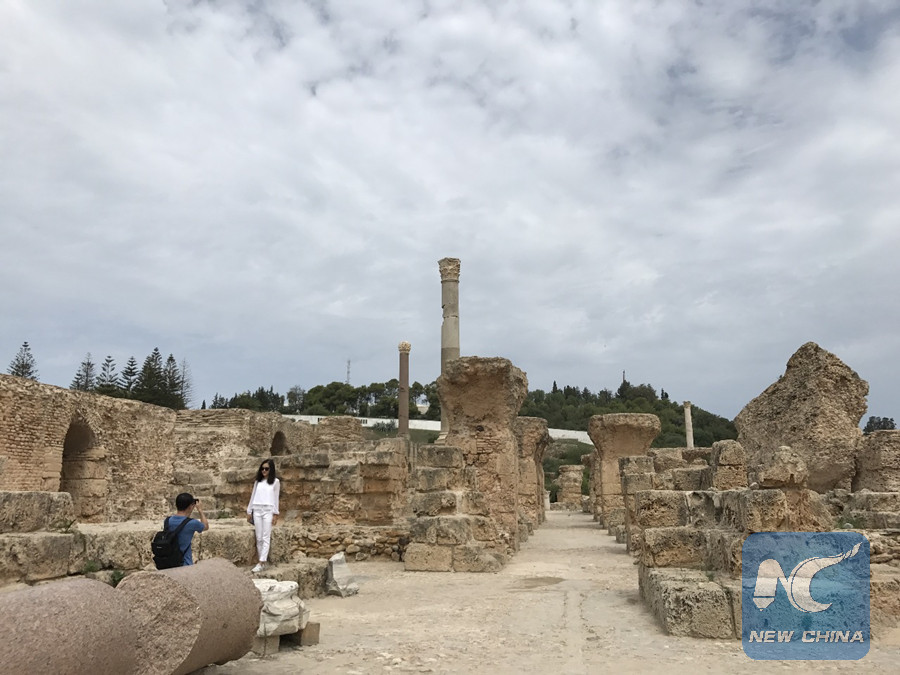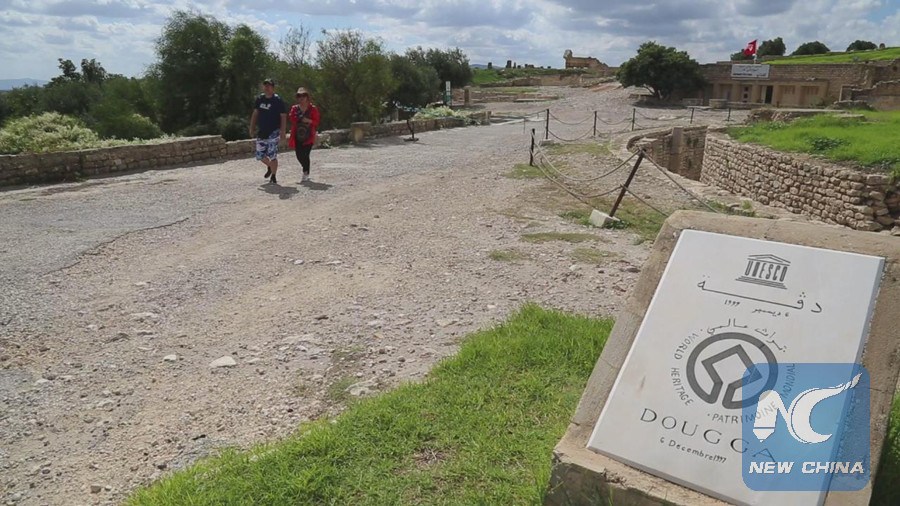Two Chinese tourists take photos at the Carthage archeological site in northern Tunisia on Sept. 10, 2018. (Xinhua photo)
At an open-air Roman theater in Dougga archeological site, a young Chinese couple was taking part in a special performance testing the acoustic refraction of the architecture.
"Although I sit at the last row of audience seats, I could hear my wife's unaccompanied songs on the stage clearly, as Romans adopted the acoustic refraction", said Li Xiaofeng, a 28-year-old Chinese self-guided traveler from Shanghai.
Located in northern Tunisia, covering an area of 70 hectares, Dougga possesses remarkable architectural heritage, mostly dating back to the 2nd and 3rd century, including temples, theaters, public baths and private houses.
"I learn that Dougga is considered as the best preserved example of ancient Roman city in North Africa, also a UNESCO World Heritage," said Li excitedly, "so it's a must-see place in Tunisia for us."
Lying at the north point of African continent, with a history of over 3,000 years, Tunisia is rich in tourism resources. Renowned for its cultural diversity, Tunisia boasts seven World Cultural Heritage sites.
Two Chinese tourists visit the Dougga archeological site in northern Tunisia on Sept. 26. (Xinhua photo)
"We have visited Carthage and Medina," said Li. "After visiting Dougga, we will drive south to visit Kairouan city and El Jem Amphitheatre."
Mohamed Basly, president of China-Tunisia Cooperation Council, said "the mixed elements of North African history and Arab culture are combined harmoniously in Tunisia, which makes Tunisia an attractive destination to Chinese tourists."
Basly pointed out that Chinese tourists are interested in historical monuments.
In 2017, Tunisia began to offer visa-free entry to Chinese tourists and the number of Chinese tourists rocketed to around 20,000 last year, 12,000 more than 2016. China has become one of Tunisia's fastest-growing tourism markets.
Abu Khalifa, a 77-year-old local tour guide, runs a souvenir shop for 32 years near the Basins of Aghlabids, a scenic spot in Kairouan city in central Tunisia.
"If you search Chinese tourists and Kairouan on the internet, it's easy to find my photos. I'm very famous among Chinese visitors," said Khalifa with a big smile, dressing in Tunisian traditional red hat and robe.
Founded in 670, Kairouan flourished under Aghlabid dynasty in the 9th century, known as one of the holy cities and spiritual capitals of Islam. Listed as World Heritage in 1988, Kairouan has rich architectural heritage, including the Great Mosque, Three Gates Mosque, the Basins of Aghlabids and the Zawiya of Sidi Sahib.
A group of Chinese tourists visit the Great Mosque in Kairouan City in north-central Tunisia on Sept. 25, 2018. (Xinhua photo)
"I love Chinese visitors, because they would like to deepen their historical knowledge and to acquire more about local history," said Khalifa. "Since last year, more Chinese tourist groups have come here, sometimes even six tourism buses in one day."
As of Sept. 20, over 19,000 Chinese tourists have visited Tunisia in 2018, with a significant growth of 50 percent year on year, said statistics from Tunisian Government Presidency.
Tunisian Ambassador to China Dhia Khaled said Tunisia has become an increasingly popular destination for Chinese tourists.
"We are capable of and are willing to have more Chinese tourists visit our country," Khaled said. "Tunisia values cooperation with China in tourism and looks forward to a higher level of cooperation."
Karim Jatlaoui, the representative of Tunisian National Tourism Office Beijing Bureau, expects Chinese tourists to Tunisia to increase to 50,000 by 2020.
Mohamed Basly added, to better meet Chinese tourists' demands, Tunisia would prepare adequate infrastructure and highlight its rich cultural and historical heritage.
Tunisia witnessed a slump in its tourism since 2015 when three major terrorist attacks claimed the lives of more than 70 people, mostly foreign tourists and security forces. Accounting for about eight percent of the country's GDP, tourism sector started to revive in 2017.
Tunisian President Beji Caid Essebsi said Tunisia welcomes more tourists from China, during his meeting with a visiting Chinese delegation in late June.
Earlier this year, Tunisian Minister of Tourism Salma Elloumi said Chinese market would be a significant factor to revive Tunisian tourism industry.


